Related Research Articles
Leofric was a medieval Bishop of Exeter. Probably a native of Cornwall, he was educated on the continent. At the time Edward the Confessor was in exile before his succession to the English throne, Leofric joined his service and returned to England with him. After he became king, Edward rewarded Leofric with lands. Although a 12th-century source claims Leofric held the office of chancellor, modern historians agree he never did so.

Walter de Stapledon was Bishop of Exeter 1308–1326 and twice Lord High Treasurer of England, in 1320 and 1322. He founded Exeter College, Oxford and contributed liberally to the rebuilding of Exeter Cathedral. His tomb and monument, of great architectural importance, survives in Exeter Cathedral. He was killed by a mob during the London uprising.

The Bishop of Exeter is the ordinary of the Church of England Diocese of Exeter in the Province of Canterbury. Since 30 April 2014 the ordinary has been Robert Atwell.
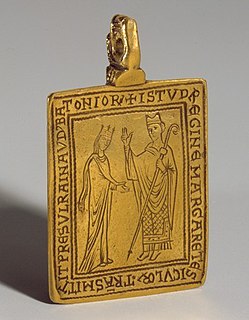
Reginald fitz Jocelin was a medieval Bishop of Bath and an Archbishop of Canterbury-elect in England. A member of an Anglo-Norman noble family, he was the son of a bishop, and was educated in Italy. He was a household clerk for Thomas Becket, but by 1167 he was serving King Henry II of England. He was also a favourite of King Louis VII of France, who had him appointed abbot of the Abbey of Corbeil. After Reginald angered Becket while attempting to help negotiate a settlement between Becket and the king, Becket called him "that offspring of fornication, that enemy to the peace of the Church, that traitor." When he was elected as a bishop, the election was challenged by King Henry's eldest son, Henry the Young King, and Reginald was forced to go to Rome to be confirmed by Pope Alexander III. He attended the Third Lateran Council in 1179, and spent much of his time administering his diocese. He was elected Archbishop of Canterbury in 1191, but died before he could be installed.
Rev. John Prince (1643–1723), vicar of Totnes and Berry Pomeroy in Devon, England, was a biographer. He is best known for his Worthies of Devon, a series of biographies of Devon-born notables covering the period before the Norman Conquest to his own era. He became the subject of a sexual scandal, the court records of which were made into a book in 2001 and a play in 2005.

Condor was a legendary Cornish nobleman. The first known mentions of Condor are from antiquarians in the late sixteenth century, who recorded claims that he had been earl of Cornwall at the time of the Norman Conquest of England in 1066, and paid homage to William the Conqueror to keep his position. William Hals speculated that he may have supported the rebels at the Siege of Exeter (1068) and lost his earldom; much of Cornwall was given to William's Norman supporters soon afterwards. Condor's son Cadoc may have regained the title under Henry I, and later passed it through his daughter to Reginald de Dunstanville.
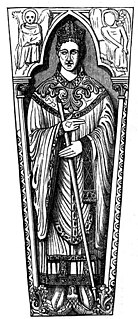
Simon of Apulia was an Italian-born canon lawyer who served as Bishop of Exeter in Devon, England, from 1214 until his death in 1223.
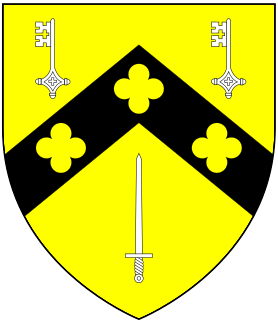
Walter Branscombe was Bishop of Exeter from 1258 to 1280.
Richard Peche was a medieval Bishop of Lichfield.
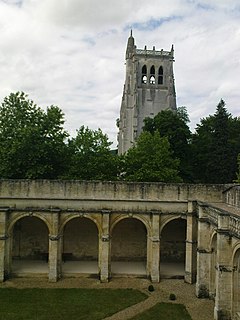
Hugh Nonant was a medieval Bishop of Coventry in England. A great-nephew and nephew of two Bishops of Lisieux, he held the office of archdeacon in that diocese before serving successively Thomas Becket, the Archbishop of Canterbury and King Henry II of England. Diplomatic successes earned him the nomination to Coventry, but diplomatic missions after his elevation led to a long delay before he was consecrated. After King Henry's death, Nonant served Henry's son, King Richard I, who rewarded him with the office of sheriff in three counties. Nonant replaced his monastic cathedral chapter with secular clergy, and attempted to persuade his fellow bishops to do the same, but was unsuccessful. When King Richard was captured and held for ransom, Nonant supported Prince John's efforts to seize power in England, but had to purchase Richard's favour when the king returned.
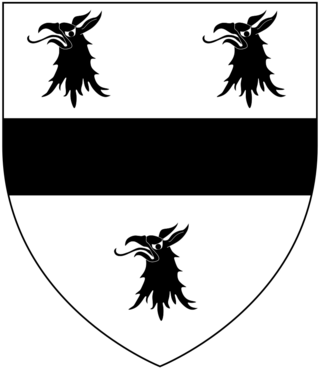
John Hales was Bishop of Coventry and Lichfield (1459-1490). He was one of the Worthies of Devon of the biographer John Prince (d.1723).
Robert Warelwast was a medieval Bishop of Exeter.
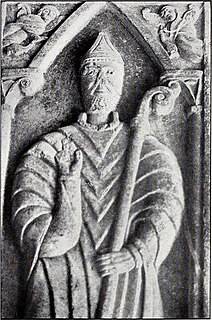
Bartholomew of Exeter was a medieval Bishop of Exeter. He came from Normandy and after being a clerk of the Archbishop of Canterbury, was made Archdeacon of Exeter in 1155. He became Bishop of Exeter in 1161. Known for his knowledge of canon law, he was involved in the Becket controversy after the appointment of Thomas Becket as Archbishop of Canterbury. After Becket's death, although he was frequently at the royal court, he mainly attended to his diocese. A number of works by him survive, including sermons and treatises on law and theology.
Henry Marshal was a medieval Bishop of Exeter.

Tristram Risdon was an English antiquarian and topographer, and the author of Survey of the County of Devon. He was able to devote most of his life to writing this work. After he completed it in about 1632 it circulated around interested people in several manuscript copies for almost 80 years before it was first published by Edmund Curll in a very inferior form. A full version was not published until 1811. Risdon also collected information about genealogy and heraldry in a note-book; this was edited and published in 1897.

Richard Reynell (1519–1585) of East Ogwell, Devon, was an English Member of Parliament. An account of him and his sons is given by John Prince in his Worthies of Devon.

Doctor George Cary (1611–1680), Professor of Sacred Theology, lord of the manor of Clovelly, Devon, was Dean of Exeter between 1663 and 1680. He was also Rector of Clovelly and of Shobrooke in Devon and Chaplain in Ordinary to King Charles II. He was one of the Worthies of Devon of John Prince.
Caunter is a surname originating principally in the West Country in England. The name derives from Anglo-Norman caunter/cauntour, "singer, one who leads the singing", or from Latin cantor, referring to precentors in cathedrals or monasteries.
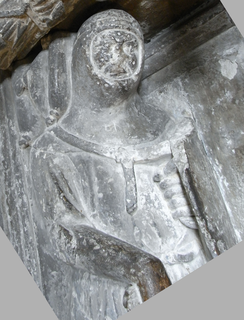
Sir Richard de Stapledon of Annery in the parish of Monkleigh, North Devon, England, was a judge and the elder brother of Walter de Stapledon (1261-1326), Bishop of Exeter. His effigy and monument survive in Exeter Cathedral.
References
- Barlow, Frank (24 May 2007). "John the Chanter (d. 1191)". Oxford Dictionary of National Biography (online ed.). Oxford University Press. doi:10.1093/ref:odnb/94378.(Subscription or UK public library membership required.)
- Fryde, E. B.; Greenway, D. E.; Porter, S.; Roy, I. (1996). Handbook of British Chronology (Third revised ed.). Cambridge, UK: Cambridge University Press. ISBN 0-521-56350-X.
- "John the Chanter's tomb in Exeter Cathedral". Exeter Cathedral. Archived from the original on 31 August 2007. Retrieved 26 October 2007.
- Prince, John (1810). Danmonii orientales illustres: or, The worthies of Devon. A work, wherein the lives and fortunes of the most famous divines, statesmen, swordsmen, physicians, writers, and other eminent persons, natives of that most noble province, from before the Norman conquest, down to the present age, are memorized. Plymouth: Rees & Curtis. pp. 202–203.